January 21, 2013
by Carole Zangari -
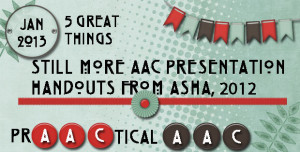
Hope that many of our prAACtical friends are working on proposals for the 2013 ASHA Convention in Chicago. To inspire us all, here are five presentation handouts from previous annual conference. AAC: What Was, Is, & Hopefully Will Be by David Yoder Effectiveness of Telerehabilitation in AAC Service Delivery by Tanya Curtis Creating a Framework for AAC Evidence-Based Assessment by Elizabeth (Libby) Rush and Celeste Helling Determining Effectiveness of a Communication Program for Children With Autism by Meher Banajee, Timothy Morse, Angie Pardee and Morgan Weihing AAC & Autism: Collaboration, Training, & Data Collection in School by Amy Golding and Deidre King Good luck with those proposals!
Filed under: PrAACtical Thinking
Tagged With: 2012 ASHA Convention, asha convention, handout, presentations
January 18, 2013
by Carole Zangari -
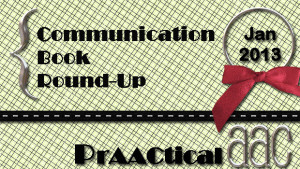
Working on a communication book for someone with AAC needs? Here are some posts on that topic. The PrAACtical Power of Communication Books Do It My Way: Personalizing Communication Books Communication Books: Making Decisions About Format Quick Start Communication Book Pages Organizing Vocabulary for Communication Books: Getting Started The Communication Book is Ready: Now What? PrAACtically Personal: Individualizing Communication Books 10 Resources for Planning and Designing Communication Books 5+ Ways to Make Page Fluffers and Spacers PrAACtical Resources for AAC Symbols
Filed under: PrAACtical Thinking
Tagged With: communication book
January 17, 2013
by Carole Zangari -
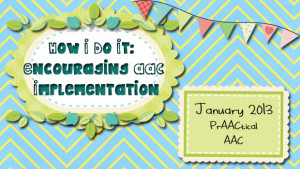
Nothing makes us happier than hearing AAC success stories. It’s thrilling to hear of folks who are using AAC tools and strategies to communicate effectively. We love hearing how their language develops and the positive changes that makes in their lives. It also makes us curious as to what made ‘this’ story a success story. One of our goals for the new year was to give PrAACtical AAC followers a look into the experiences of professionals outside their own communities. Last week, we introduced AACtual Therapy, a series of guest posts by SLPs who are willing to give us a peek into their AAC therapy sessions. Today, we introduce How I Do It, a series in which we invite SLPs to share how they tackle common issues, tasks, or problems. We’re excited to launch the series with a post from Lauren Enders, a clinician who supports the AAC community beyond... [Read More...]
Filed under: PrAACtical Thinking
Tagged With: aided language input, core vocabulary, How I Do It, Lauren Enders
January 16, 2013
by Robin Parker -
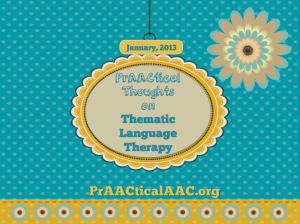
Thematic language therapy can be part of a meaningful language experience. This is true for everyone but especially helpful for learners with social communication/language difficulties. The theme of a session or theme of a month (or semester) can help a learner understand the relationship of individual activities to a larger main idea. For some learners it is easier to understand the details than to understand the ‘big picture’. By adding well thought out thematic features in intervention, the learner can then have many opportunities to relate the component parts of a theme to a main topic. Another aspect and benefit of thematic language learning has to do with word, concept, & vocabulary access. If a theme is used in a variety (or ALL) activities, there is a greater chance that the learner will be using similar words and concepts in talking, listening, reading and writing. By using all language modalities, vocabulary, word... [Read More...]
Filed under: PrAACtical Thinking
Tagged With: intervention, Thematic Language Therapy
January 15, 2013
by Carole Zangari -
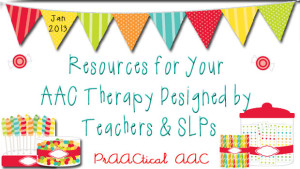
2012 was certainly the year that saw an explosion of SLPs and teachers authoring materials that they offer for sale. TeachersPayTeachers (TpT) is one of several sites that became popular this year and is credited with giving a huge boost to the movement. Here are some of prAACtical interest. Kate Ahern’s Core Word Boards: This set of communication boards can be a big timesaver for anyone who wants to implement a core word approach and needs help in getting set up with some initial materials. (17 pp) Fun for Learning’s visual support with a Star Wars Theme. Use this (or one of her other thematic kits) to customize picture schedules and supports based on the learner’s area of interest. (Free) Working on semantics? This PowerPoint template for making vocabulary teaching supports from Jerilyn can be used to provide practice. (Free) Teaching interrogatives is something that most of us don’t... [Read More...]
Filed under: PrAACtical Thinking
Tagged With: five, resources, TeachersPayTeachers
January 14, 2013
by Robin Parker -
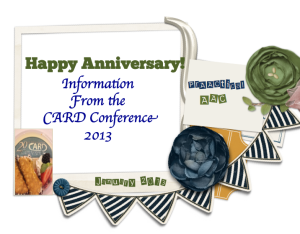
It was more than 20 years ago when the idea of a Florida Statewide Autism Resource Center was formed. This weekend marked the 20th Anniversary Celebration Conference of that unique and progressive vision. The Center for Autism & Related Disabilities (CARD) was created and flourishes through the collaboration of so many dedicated and energetic parents and professionals. Today, CARD is known as ‘Florida’s First Choice for Autism Support’. What is CARD? CARD is a comprehensive outreach and support program serving people with autism and related disabilities, their families, and the professionals who work with them. CARD seeks to provide support and assistance with the goal of optimizing the potential of people with autism, dual sensory impairment, and related disabilities. CARD is a Florida State Grant Program that provides all services at NO COST to the people who use them. The CARD Conference This years CARD conference was at the beautiful... [Read More...]
Filed under: PrAACtical Thinking
Tagged With: ASD, CARD Conference, Pivotal Response Treatment, Visual Strategies
January 11, 2013
by Carole Zangari -
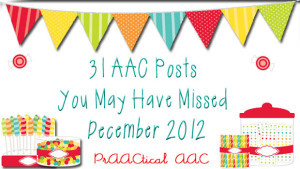
PrAACtically Thinking Happy New Year Let’s Cook: It’s PrAACtically the New Year! 10 Resources for Planning and Designing Communication Books Why We Love AAC Language Experience Activities AAC Vocabulary Instruction Round-Up Beyond Good Intentions: Thoughts on PrAACtical Supports for AAC Families No Words: “We’re Hurting, Too” Quick Start Communication Book Pages Talk About Me, Too: AAC and Visual Strategies for Significant Challenges The PrAACtical Side of Giving: Random AACts of Kindness Hello, Holiday! 10 Great Apps to Gift Do It My Way: Personalizing Communication Books 31 AAC Posts You May Have Missed, November 2012 Why We Love Sequential Message Devices/Apps Strategy of the Month The PrAACtical Power of Communication Books Organizing Vocabulary for Communication Books: Getting Started Communication Books: Making Decisions About Format The Communication Book is Ready: Now What? PrAACtically Personal: Individualizing Communication Books Video of the Week Making Libraries Inclusive Inclusive Libraries, Part 2 Why Use AAC? Why... [Read More...]
Filed under: PrAACtical Thinking
January 10, 2013
by Carole Zangari -
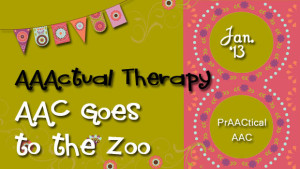
Welcome to AACtual Therapy, a new series on PrAACtical AAC that we’re undertaking in order to give you an up-close-and-personal look at SLPs who ‘do’ AAC. Each of these posts will feature one of our prAACtical friends, some of whom have been AAC interventionists for awhile and others who have come to it more recently. Each one is passionate about giving people a voice no matter what their age or ability level. They’ll be giving us a peek into an AAC therapy lesson that they use, and telling us about the strategies that make it successful. They’ll share a bit about the goals and objectives the lesson was designed to address, and what sorts of AAC their clients are using. Hopefully, we’ll see them in action Here’s what NOT to expect: Perfection. It doesn’t exist, so we don’t even bother looking for it. We’re featuring these clinicians because we want... [Read More...]
Filed under: PrAACtical Thinking
Tagged With: AACtual therapy, generalization, preschool
January 9, 2013
by Robin Parker -
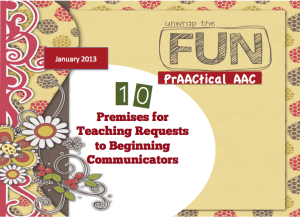
Requesting is a communication skill that is often a fun goal to target because the end result should be ‘giving’ the learner what they want. Here are some underlying premises when teaching requests: The learner LOVES or places IMPORTANCE on what they are requesting The facilitator may need to LOOK for & ACCEPT what the learner prefers MOTIVATION and INTEREST can be TAUGHT with frequent and varied practice in predictable routines Communication temptations give requesting more CLARITY for the learner Learners can request WITHOUT being asked a question (in fact, it helps with spontaneity) Requests can be facilitated through CHOICE MAKING Requests and choices GO WAY BEYOND food & objects The facilitator can MODEL requesting and choice making and then give the learner a turn There can be monthly, daily, hourly, minute, or even second CHANGES in preferences, motivations, and interests Frequent OPPORTUNITIES for requests and choices are the key... [Read More...]
Filed under: PrAACtical Thinking
Tagged With: beginning communicators, choice making, communication temptations, requests
January 8, 2013
by Carole Zangari -
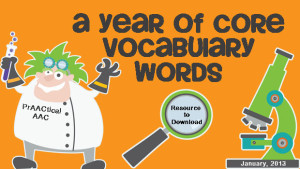
As clinicians, we frequently ask ourselves how we can help AAC learners become fluent with their core vocabulary words. A big part of the answer can be summed up in a word: Focus. The more we focus on those words, the more we can impact learning. There are lots of things competing for our attention, though, and sometimes we get distracted. Then it came to us: Visual supports work for SLP’s, too! When we saw another blogger post visual supports for sight word reading, we knew the idea had prAACtical application. So, we created 12 grids of core vocabulary words – one for each month of the year. Each grid has 12 cells labeled with core words. Plug in the AAC symbols that your client uses (e.g., PCS, SymbolStix, Unity, Pixons, etc), print, laminate, and keep them handy. Feel free to adapt the grids with other core words, if you... [Read More...]
Filed under: PrAACtical Thinking
Tagged With: core vocabulary, download









